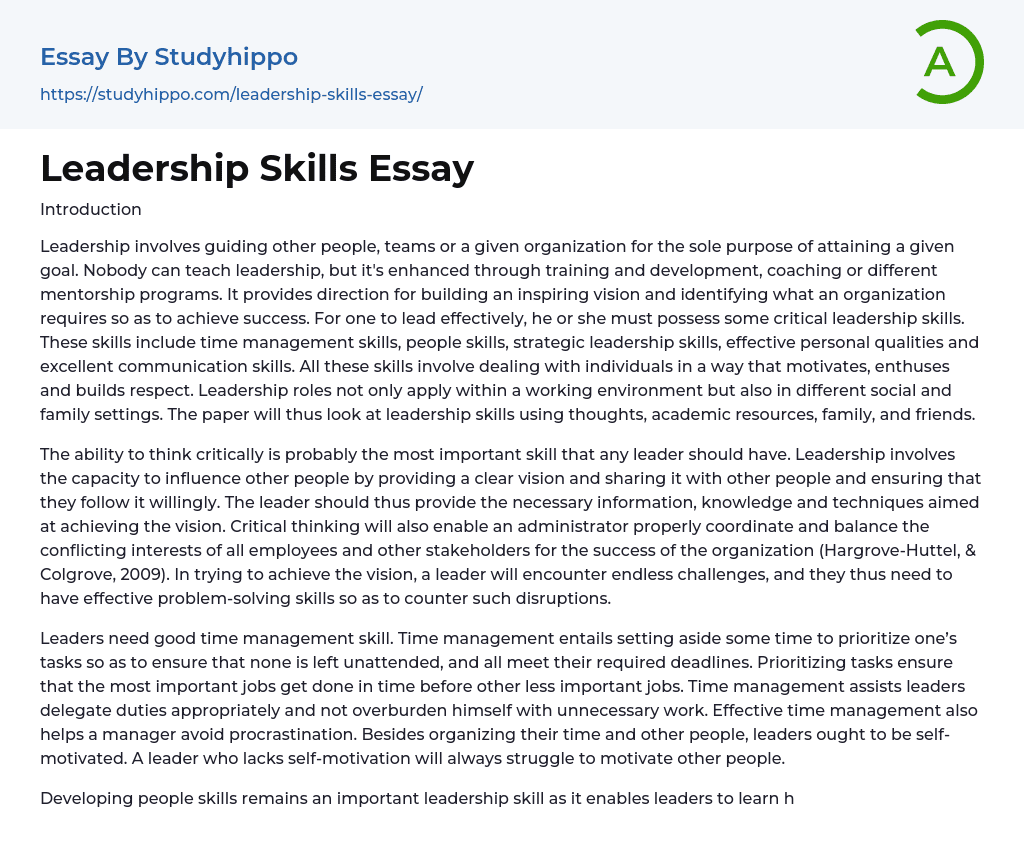Introduction
Leadership involves guiding other people, teams or a given organization for the sole purpose of attaining a given goal. Nobody can teach leadership, but it's enhanced through training and development, coaching or different mentorship programs. It provides direction for building an inspiring vision and identifying what an organization requires so as to achieve success. For one to lead effectively, he or she must possess some critical leadership skills. These skills include time management skills, people skills, strategic leadership skills, effective personal qualities and excellent communication skills. All these skills involve dealing with individuals in a way that motivates, enthuses and builds respect. Leadership roles not only apply within a working environment but also in different social and family settings. The paper will thus look at leadership skills using thoughts, academic resources, family, and friends.
...The ability to think critically is probably the most important skill that any leader should have. Leadership involves the capacity to influence other people by providing a clear vision and sharing it with other people and ensuring that they follow it willingly. The leader should thus provide the necessary information, knowledge and techniques aimed at achieving the vision. Critical thinking will also enable an administrator properly coordinate and balance the conflicting interests of all employees and other stakeholders for the success of the organization (Hargrove-Huttel, & Colgrove, 2009). In trying to achieve the vision, a leader will encounter endless challenges, and they thus need to have effective problem-solving skills so as to counter such disruptions.
Leaders need good time management skill. Time management entails setting aside some time to prioritize one’s tasks so as to ensure that none is left unattended, and all
meet their required deadlines. Prioritizing tasks ensure that the most important jobs get done in time before other less important jobs. Time management assists leaders delegate duties appropriately and not overburden himself with unnecessary work. Effective time management also helps a manager avoid procrastination. Besides organizing their time and other people, leaders ought to be self-motivated. A leader who lacks self-motivation will always struggle to motivate other people.
Developing people skills remains an important leadership skill as it enables leaders to learn how to work with others on both a one-on-one basis and on a group basis. People skills allow a manager deal efficiently with a broad range of situations such as employees’ conflicts and disagreements with other stakeholders to the satisfaction of all involved parties (Chin, & Trimble, 2015). Having good people skills enables a leader to take in different opinions thus creating a motivational environment for others. Good people skills give a manager the ability to build personal relationships with other individuals and thus enables him to give views of their individual performances in a constructive manner.
Leaders also need to develop effective personal qualities such as being charismatic, kind, empathetic, sincere, hardworking, trustworthy, creative, fair and patient. A leader should also possess integrity as it reflects a deep conviction of always doing the correct thing for the right reason no matter the circumstances. A leader with integrity is incorruptible and is incapable of breaking the trust of those who have confided in him. A leader needs to have good communication skills so as to clearly communicate his or her vision to others and motivate them appropriately with the aim of achieving the said vision.
Leaders should also be good listeners to enable them elicit information by proper questioning. Excellent communication skills thus enable a manager to become a good public speaker and to develop strong negotiation skills (Barker, 2013).
In conclusion, having the right leadership skills plays a critical role in ensuring that a leader achieves his or her success. All leaders should thus strive to develop good leadership skills that include excellent communication, efficient personal qualities, good people skill, critical thinking and good time management skills.
References
- Barker, A. (2013). Improve your communication skills.
- Chin, J. L., & Trimble, J. E. (2015). Diversity and leadership.
- Hargrove-Huttel, R. A., & Colgrove, K. C. (2009). Client management and leadership success: A course review applying critical thinking skills to test taking. Philadelphia: F.A. Davis.




